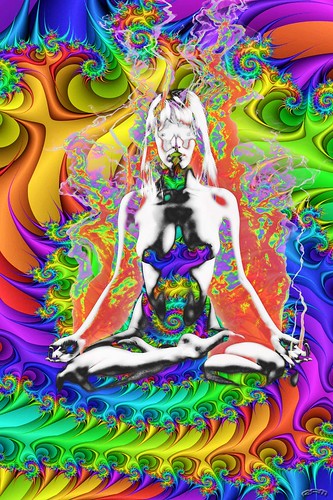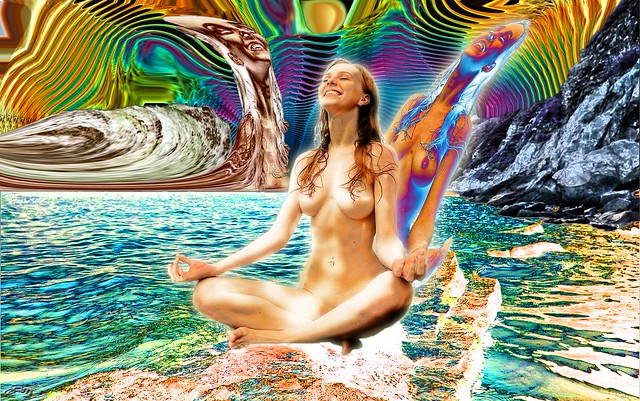Meditation and States of Consciousness: Osho

Osho, a contemporary mystic speaks on virtually every aspect of human consciousness. In these talks, osho introduces us with meditation and various layers of Consciousness…
Here
Osho responds to the following questions:
Osho,
What do you say about meditation according to the three states of
consciousness?
Concentration is concerned with the instinctive layer, hence even animals are capable of concentration. When an animal is hunting game he is utterly concentrated. He is unmoving, not making even a little stir. And if you see his eyes, they are fixed, unblinking.
In fact, it is one of the findings of great hunters…. Once in a while it has happened that barehanded a hunter has come across a lion, and there was no way to escape – the lion was coming closer to him with his eyes fixed. Because the hunter was unable to escape, just unconsciously, without knowing what he was doing – of course he was frozen to death – the hunter’s eyes also became unblinking, and he was watching every move of the lion, so he was looking into his eyes.
And this is how it was discovered that if you look into the eyes of the lion just for a minute or two, the lion becomes hypnotized. He forgets to kill you. He forgets everything; he falls into a coma.
Gurdjieff remembers in his memoirs that while he was moving with the nomads near the Caucasus, he found they all hypnotized their animals. Nomads are moving people, a few days here, a few days there; they don’t stay in one place. They have a totally different culture. They don’t think much of you who live in cities and in houses. They think you are dead, finished; you have made your graves yourself.
What is life if you are not under the sun, under the sky, always moving into the unknown? – managing moment to moment, not being worried about tomorrow. They don’t believe in your law, they don’t believe in your state – they don’t believe in anything. They can steal, there is no problem; they can kill, there is no problem. They are a totally different people, and they are not ready – many governments have been trying to settle them, prohibiting them….
But you will be surprised, even in Europe the nomads are all Indians from Rajputana. In fact, all over the world the nomads are Indians from Rajputana – one particular state. They all speak Rajputani. The language has changed, taken on different forms, but still you can figure out that they are speaking Rajputani. In Europe you call them gypsies, because from Rajputana they first went to Egypt, and after remaining in Egypt they moved to Europe. Because of this movement coming from Egypt, they became gypsies.
Gurdjieff was with these people, and these people have a different kind of wisdom – not bookish but from actual experience. And they have been moving around the earth experiencing so many things…. A person who flies from New York to London cannot say that he has toured from New York to London, flying in an airplane is not an experience. But moving on the earth, making your way through different societies, different laws, different difficulties, different problems, every day is real experience.
Gurdjieff said that these people knew a certain art of hypnosis. It was not much of an art, it was a simple process you can practise on your dog, on your cat. But if they are your pets it becomes difficult because they start moving here and there; they will not keep their eyes fixed on you. On wild animals it is very simple.
These nomads had to pass through wild areas, and that was their practice…. Gurdjieff was very young nine or ten, and he watched them: even if a lion came all the nomads, the men, would stand in front staring at the lion without blinking their eyes. And something happened – the lion simply collapsed, fell, as if there were no life in him. And immediately those gypsies would jump and catch hold of the lion; and by the time he came back to his senses, he would be captured, without any weapon.
Concentration is instinctive.
Everybody can practice it; all that is needed is to pinpoint your consciousness.
Contemplation is of the intellect.
It is beyond animals, and beyond most human beings – not absolutely beyond; if they try they can rise up to it. Contemplation needs your interest to be wide enough so that you can create a space in the mind to move. You need much information about a single subject so that you can move around the single subject without changing it, and yet moving, keeping in the same area.
For example, you are thinking about truth or love or religion: you keep yourself in the same area, but you look at it from every possible angle. And you will be surprised – there are always angles which have never been looked at. Life is so mysterious, there are always aspects which you may be the first to discover.
That’s how science functions. The subjects are not new, these are the same subjects. From Archimedes to Albert Einstein there is not much difference; they are thinking about the same subject, but new aspects go on revealing themselves. And each aspect becomes almost an area in itself.
You can watch the progress of science, then you will understand.
In Oxford University the board hanging by the department of physics says: “Department of Natural Philosophy.” That is strange, because it was one thousand years ago that physics was part of natural philosophy. The board is one thousand years old; although painted again and again, although different boards may have come, the writing has remained the same. Now philosophy has nothing to do with physics.
In Saugar University where I did my postgraduate work, by the department of philosophy the board read: “Department of Psychology and Philosophy.” That too is one hundred years old. The university is new, but the founder was an old man and when he was studying philosophy and psychology were one subject. Now psychology has a separate individuality.
I told my professors, “This is stupid – drop it.”
But they said, “It is a historical monument. Leave it there.”
I said, “Now psychology is no longer being taught here. Why psychology and philosophy?” It used to be that psychology was part of philosophy, then they separated; now psychology has separated into different parts. Philosophy was part of physics; now physics has separated into different departments.
You go on contemplating and you find a new area which is vast enough to be a subject unto itself.
And as you go into details you find that there are still branches moving apart. So there is now bio-physics. No philosopher has ever contemplated that bio-physics is possible. Metaphysics is possible, but it is completely finished; there is no department of metaphysics anywhere.
Metaphysics used to be in Aristotle’s time – and for a very strange reason. Aristotle wrote the first history of philosophy; he wrote all the chapters. One of the chapters is physics, and after the physics chapter comes philosophy. Just because it comes after physics – metaphysics means after physics – because the chapter came after physics, slowly it became known as metaphysics: the chapter that comes after physics.
When philosophy came into its own, metaphysics, the very word, simply disappeared. It is not used any more – although it seems it may have a revival, a resurrection, because now physics is coming very close to philosophy, becoming more mysterious, finding more areas which cannot be explained by logic, cannot be explained by science. Perhaps they will start calling it metaphysics. It is beyond physics, after physics. Higher physics they are calling it now.
Contemplation is just the process of thinking, refining your thoughts; and the more you practise this refinement, the finer they become. And it is a joy in itself. It is a joy far superior to anything like food, sex, clothes; it is a finer joy. When you come across a new phenomenon which for millions of years people have passed by and nobody has detected and which you are the first to detect, a tremendous joy arises in you.
Contemplation
is of the intellect.
Meditation has no subject matter.
It is pure subjectivity.
Meditation is not thinking about something.
It is not thinking at all.
But one thing has to be remembered: it does not mean falling asleep. That’s what happens; if you are not thinking then the mind says, “What are you doing? Go to sleep.” Mind is at ease with thinking or with sleep, and just between the two is meditation: no thinking, no sleep. Thinking has been dropped and sleep has not been taken up. You are fully awake. It is awareness without thoughts.
The road of your mind is completely empty of the continuous traffic of thoughts.
In that state of no-mind is hidden the ultimate secret – the secret of your being and the secret of the whole universe… because at the point of your being all points meet together. Your point is also the center of the whole universe. The further you go into thought, the further you move away from your center and also from the universe. Hence, I was suggesting a very simple method for all universities.
Buddha used to call it vipassana. The word is beautiful, simple, meaningful. It means just watching.
pashya means to see and passana means to see very carefully. Vipassana means to see carefully but without thinking. You are just there, sitting silently, doing nothing.
In the West the proverb is that the idle mind is the devil’s workshop. It is not true. The idle mind, absolutely idle, is where your real birth happens. The mind full of thoughts is the devil’s workshop because it is continuously giving you ideas: “Do this, do that.” The silent mind… how can the silent mind be the devil’s workshop?
The West never attained to the state of meditation; it remained only at the state of contemplation.
Concentration happened, contemplation happened, but meditation remained something unexplored by the West. Perhaps the conditions were not ready for it, ripe for it. Perhaps the West was too much concerned with physical survival. Life was difficult, the climate was cold; hard work was needed to survive.
In the East the climate was warm and not much work was needed to survive. One person in a family used to work and the whole family used to enjoy themselves. There was no need for everybody to work. The land was fertile, the population was small – and the land was giving so much without much effort that naturally people started exploring just sitting silently, doing nothing. It was a natural phenomenon to happen.
So many people were without any work – that’s why so many people became monks. And there was no trouble, no problem. Otherwise to so many monks you have to give food, you have to give clothes, you have to give shelter, because they don’t work. But there was no problem: people had enough to eat and they could give enough. Millions of monks roamed around the country, and all that they were doing was one thing…. Never in the history of man were so many people trying to sit silently and just be absolutely quiet not even a stir, not even a little breeze. And they attained it.
And that’s why I suggest each university should have an institute for meditation. Arrange the right climate, the right atmosphere – beautiful gardens, Zen-type cottages, ponds, trees, and small, Zen- type meditation rooms so every student, before he comes out of university, brings the quality of meditation with him.
Once we can help people to be deprogrammed and leave them just clean slates and, secondly, can help them to enjoy this cleanliness so that they never clutter it up again, we have prepared the foundation for a new humanity, for a new world without boundaries, without nations, without cults, creeds, religions – just one vast commune surrounding the whole world.
From www.osho.com via Mystic
Banana @ http://www.mysticbanana.com/osho-meditation-and-states-of-consciousness.html
For more information about meditation see http://nexusilluminati.blogspot.com/search/label/meditation
- Scroll down
through ‘Older Posts’ at the end of each section
Hope you like this
not for profit site -
It takes hours of work every day by
a genuinely incapacitated invalid to maintain, write, edit, research,
illustrate and publish this website from a tiny cabin in a remote forest
Like what you see? Please give anything
you can -
Contribute any amount and receive at
least one New Illuminati eBook!
(You can use a card
securely if you don’t use Paypal)
Please click below -
Spare Bitcoin
change?
Xtra Images by R. Ayana – https://c2.staticflickr.com/4/3943/15725946492_a54084c47a_k.jpg
For further enlightening
information enter a word or phrase into the random synchronistic search box @
the top left of http://nexusilluminati.blogspot.com
And see
New Illuminati – http://nexusilluminati.blogspot.com
New Illuminati on Facebook - https://www.facebook.com/the.new.illuminati
New Illuminati Youtube Channel - https://www.youtube.com/user/newilluminati/playlists
New Illuminati’s OWN Youtube Videos
-
New Illuminati on Google+ @ For
New Illuminati posts - https://plus.google.com/u/0/+RamAyana0/posts
New Illuminati on Twitter @ www.twitter.com/new_illuminati
New Illuminations –Art(icles) by
R. Ayana @ http://newilluminations.blogspot.com
The Her(m)etic Hermit - http://hermetic.blog.com
DISGRUNTLED SITE ADMINS PLEASE NOTE –
We provide
a live link to your original material on your site (and links via social
networking services) - which raises your ranking on search engines and helps
spread your info further!
This site
is published under Creative Commons (Attribution) CopyRIGHT (unless an
individual article or other item is declared otherwise by the copyright
holder). Reproduction for non-profit use is permitted & encouraged - if you
give attribution to the work & author and include all links in the original
(along with this or a similar notice).
Feel free
to make non-commercial hard (printed) or software copies or mirror sites - you
never know how long something will stay glued to the web – but remember
attribution!
If you
like what you see, please send a donation (no amount is too small or too large)
or leave a comment – and thanks for reading this far…
Live long
and prosper! Together we can create the best of all possible worlds…
From the New Illuminati – http://nexusilluminati.blogspot.com




